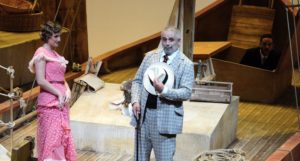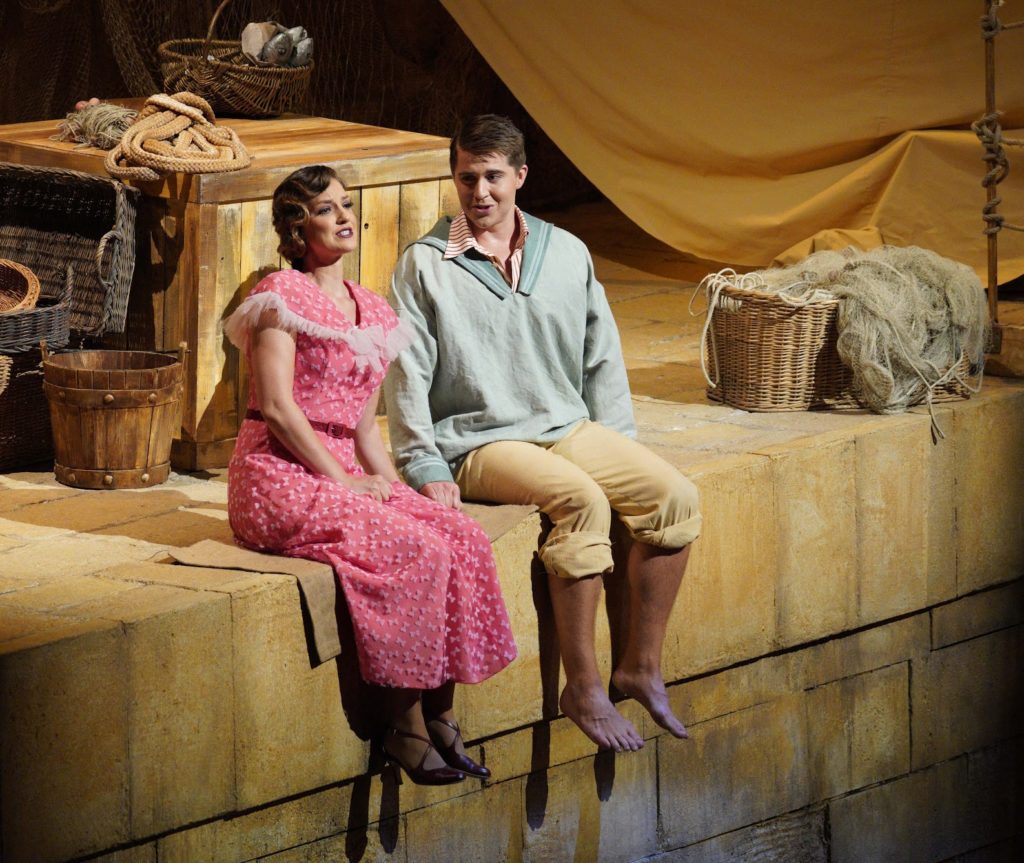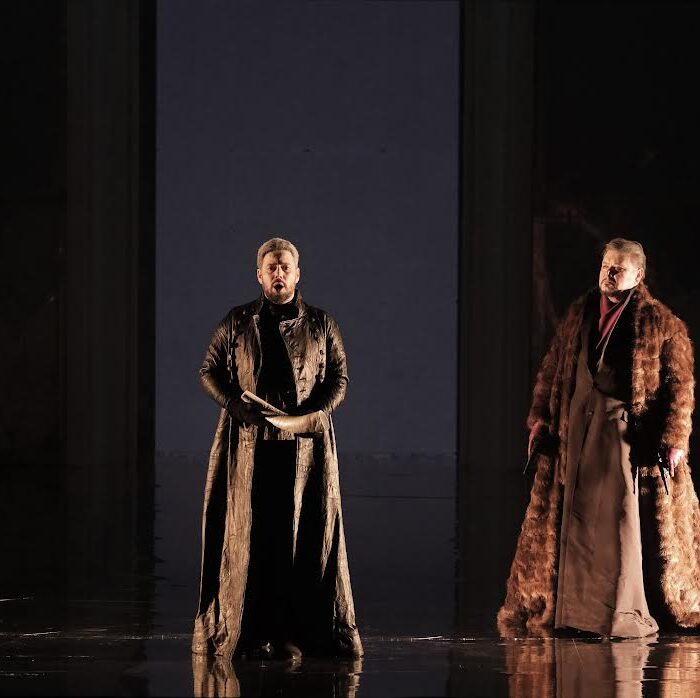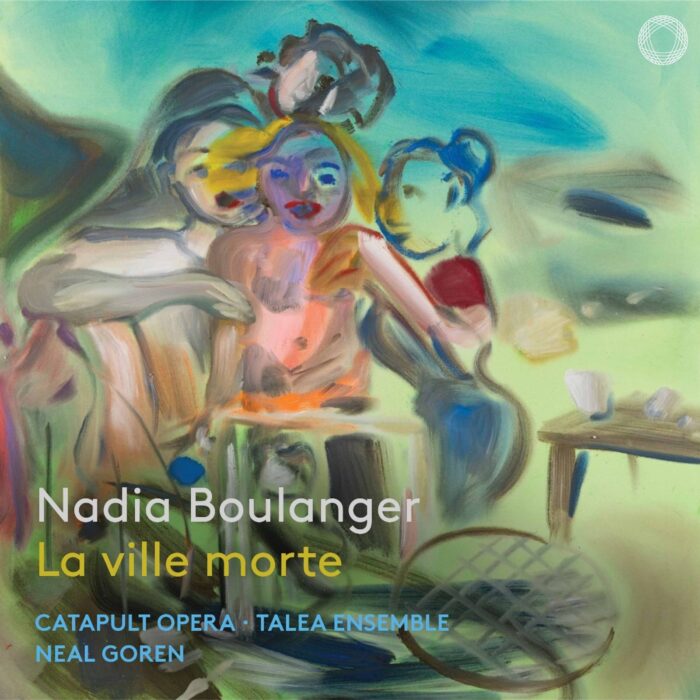
Rossini Opera Festival 2021 Review: Il Signor Bruschino
Pietro Spagnoli’s Bruschino Ignites Rossini’s One Act Opera
By Alan Neilson(Photo: Amati Bacciadi)
Rossini’s setting of “Il Signor Bruschino” to a libretto by Giuseppe Maria Foppa was the last of five one act farces Rossini wrote for Venice’s Teatro di San Moise between 1810 and 1813, and apart from “Adina” written for Lisbon in 1818, and to which he gave only cursory attention, it was a form to which he was not to return. However, he went on to employ the musical structures, which he had developed during their composition, with brilliant success in his great comedies, such as “Il Barbiere di Siviglia” and “L’Italiana in Algeri.”
The farces are wonderful works, full of sparkling music and memorable melodies, light-hearted fun, amorous trysts, disguises, and neatly drawn stereotypical characters, often taken from the commedia dell’arte. Only the most inexpert director can fail to delight the audience, and only the most hard-hearted of audiences can sit through a performance stony-faced. Yet, for the first 20 minutes of this presentation of “Il Signor Bruschino” for the Rossini Opera Festival in Pesaro it appeared that they might have a flop on their hands. It was only with the appearance of Signor Bruschino himself, played by Pietro Spagnoli, that the production found the energy and drive to kick start itself into life.
It all started well enough. The Orchestra Filharmonico Giacomo Rossini, under the baton of Michele Spotti, produced a lively, pacy, and cheerful reading of the famous overture, the second violins tapping out a rhythm on their music stands. The fixed set, designed by the directors, Barbe & Doucet, was pleasing to the eye. It consisted of two boats tied up at a quayside, bathed in a golden orange light, engineered by Guy Simard. The colorful costumes, also designed by the directors, were mostly from the early to mid 20th century, and successfully reflected the status and personality of the characters. The cast, on paper, was a strong one. Yet, the opening scenes simply failed to ignite.
A Lackluster Start
The opening scene, used to establish the relationship between Sofia and Florville, passed by without any sense of real connection between the loving couple. In the duet “Quanto è dolce a un’alma amante” both sang well enough, but there was certainly no frisson or excitement. Their acting was wooden and stilted. Nor did it help that Florville, played by tenor Jack Swanson, was portrayed as a shy, timid, and insipid young man who would be unlikely to set Sofia’s heart aflame, a decision for which the directors have to take responsibility, and one compounded by costuming him accordingly.
In the following scene, Florville sings the duet “Io danari vi darò!” with Filiberto, played by baritone Gianluca Margheri, whose strong characterization, founded upon his pleasing timbre and excellent phrasing, once again highlighted the weak character of Florville, who one could never imagine involving himself in the deception he was about to carry out. Despite the criticisms of his character, the duet allowed Swanson to display his appealing upper register.
The appearance of Giorgio Caoduro as Gaudenzio in scene four, however, started to move things in the right direction. Looking every bit a man convinced of his self-importance as he strode around the deck of his boat in his captain’s outfit, he successfully managed to stamp his personality on the role, which he reinforced with his superficial view of life in his cavatina “Nel teatro del gran mondo,” enunciating his pocketbook philosophy in a serious tone, with heavy accents to emphasize his profound thoughts, while the orchestra laughed at him.
Enter Signor Bruschino
As soon as Bruschino entered the dynamics of the performance changed. The focal point of the farce had arrived, and thanks to Spagnoli’s larger-than-life, fractious, yet amusing portrayal, the other characters also sprang to life. They now had someone against whom they could clearly define themselves, and such was Spagnoli’s presence, a reaction was unavoidable. Certainly, Swanson, in particular, appeared to be freed from the constraint he had been laboring under, and his singing became freer and more natural, although this was also probably a result of his disguise which provided his character with a little more interest.
Spagnoli’s strong characterization was founded on his natural comic timing, movement, facial expressions, and his lively, strongly-crafted recitatives, full of outrage and overstated emotion. Nor did he rely on the visual jokes provided by the directors, which to be honest, were tame by comparison. Having him wash his feet in a bowl of water which he then drinks raised no more than a murmur from the audience. His singing was also wonderfully presented. The trio “Ho la testa o è andata via?” allowed him to show off his complete exasperation, in which his vocal agility and ability to inflect the voice with multiple meanings was nicely done. His vocal jousting with Gaudenzio produced some marvelous confrontations. Both men had clearly defined characters and Spagnoli’s lively, fast-moving Bruschino contrasted perfectly with Caoduro’s straight-laced, supercilious Gaudenzio.

Credit: Amati Bacciardi
A Strong Singing Performance
Sofia played by soprano Marina Monzó made an excellent overall impression, and grew more into the role as the performance progressed. She possesses a strong agile, well-supported voice, which she used to good effect. In her aria “Ah donate il caro sposo” in which Sofia pleads with Bruschino, she took advantage to show off her bright upper register with her captivating coloratura. While her final duet with Gaudenzio “È un bel nodo che due cori” was given a pleasing rendition, with both voices complementing and contrasting with each other beautifully, her bright soprano danced nimbly and quickly alongside Caoduro’s heavier warm baritone.
The cast was completed by mezzo-soprano Chiara Tirotta who gave a strong performance as the maid Marianne and tenor Enrico Iviglia, who was solid in the role of the Commisssario. Tenor Manuel Amati, who as Bruschino’s son, put in a single appearance that lasted around two minutes caught the attention with his colorful costume, drunken behavior, and sweet-toned voice.
Spotti maintained the rhythmic vibrancy he elicited from the orchestra Filharmonico Gioachino Rossini during the overture throughout the performance, a performance which was also notable for the attention he gave to the dynamic contrasts, textural clarity, and the arching lines which carried the music forward with such fluency.
In the end, this production of “Il Signor Bruschino” turned out well, notwithstanding its teething problems in the opening scenes. However, the success had little to do with the directorial decisions of Barbe & Doucet who relied too much on the role of Bruschino to bring the other characters to life. On the other hand, the set design was aesthetically pleasing, and the golden orange light captured the heat which so afflicted Bruschino. One further criticism, which significantly undermined the nature of the work as a romantic comedy, was the misplaced inclusion of a single instance of unnecessary crudity. Why was Sofia required to caress and fondle a piece of rope in a suggestive way? It was something Monzó seemed uneasy with, and it gave the impression of being gratuitously provocative. It certainly added nothing at all to the comedy.



